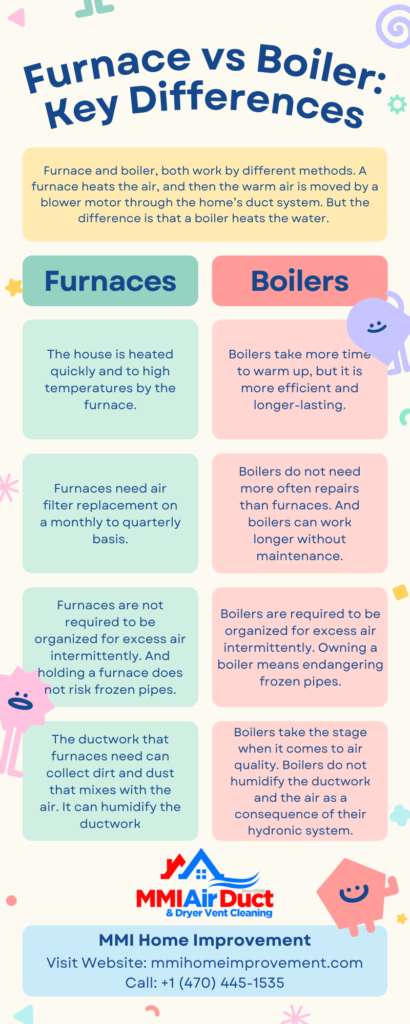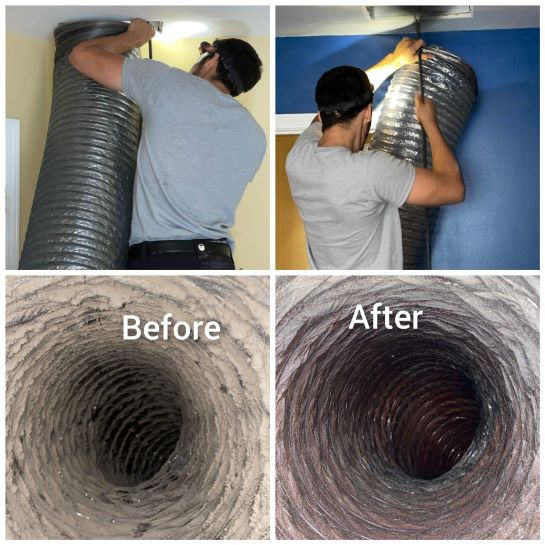We are discussing about Furnace vs. boiler and both work by different methods. A furnace heats the air, and then the warm air is moved by a blower motor through the home’s duct system. But the difference is that a boiler heats the water. And this water flows through a network of pipes in the house. As the water flows, it produces heat all over the home. The best solution to remember the difference between a boiler and a furnace is connecting one with air and water.
Some other differences between a Furnace and a Boiler:
Furnaces can be fuelled mainly by electricity and natural gas, just like boilers, but propane is also standard. Oil, solar-powered and geothermal systems are not familiar, other options. Coils used for electric heating furnaces. Rings are red hot and heat the air around them when current is run through the coil. Those furnaces burn gas to produce hot combustion. That gas enters a metal heat exchanger, heating the air around it. Air duct cleaning in Dunwoody performs; it also offers vent cleaning and HVAC duct cleaning.
- The house is heated quickly and to high temperatures by the furnace. Boilers take more time to warm up, but it is more efficient and longer-lasting.
- Furnaces need air filter replacement on a monthly to quarterly basis. They need repairs more often than boilers. But boilers can work longer without maintenance.
- At the same time, boilers are required to be organized for excess air intermittently. And owning a boiler means endangering frozen pipes, but that holding a furnace does not risk.
- However, boilers take the stage when it comes to air quality. The ductwork that furnaces need can collect dirt and dust that mixes with the air. Boilers do not humidify the ductwork and the air as a consequence of their hydronic system.
Use the below code to Embed this infographic
Both furnaces and boilers have an impressive list of pros and cons:

These heating systems have both an upside and a downside. The benefit is that these systems can heat various areas in the house. As a result, you can heat only the needed locations and save energy or utility bills. The disadvantage is that they increase moisture levels in the home. You can run a humidifier in some rooms or have a separate humidifier connected to the system to release these higher moisture levels. Dryer vent installation and repair helps promote the effective and safe operations of air systems and dryers.
There is a big difference between boiler heat vs. furnace heating. Moreover, a boiler uses steam or hot water to heat your home, and a furnace uses warm air. But the difference goes a little bit far away than just that. The method each system operates to give climate control during sub-zero temperatures is slightly different. And it is essential to look at other factors like repair cost and initial installation to find out which one is best for your home. HVAC cleaning is professional cleaning service. Health largely depends on clean air ducts.

Maintenance requirements:
For evident reasons, the maintenance needs for a furnace system are also much different than a boiler. Boiler units need little to no maintenance other than a per year service tune-up performed by a professional. On the other side, a furnace needs not only an annual service but also requires changing your air filters monthly or quarterly. If you live in a dirty area or have pets, you will want to change those more frequently, quickly adding up the expenses.
When to find out the different furnaces vs. boilers, there are also some maintenance differences from their standard counterparts. To release the risk of gas leaks or carbon monoxide poisoning, a professional service company must have checked both types of these systems once a year. HVAC cleaning in Dunwoody provides quality services and helps in the maintenance of surrounding areas.
Advantages and disadvantages:
There are some advantages and disadvantages of furnaces and boilers.
Furnaces mainly cost less and acquire far less time to install than boiler systems. And, the furnaces do not utilize water in the heating process. So, there is less chance of freezing in a wintertime power interruption. But the use of ductwork can produce a windy environment. It also increases the spread of dust, and dander is terrible for families with allergies. Those furnaces also have endangered valve leaks, and they can cause serious health issues.
On the opposite side, the radiant heat is reduced from a boiler system. It is much more comfortable than forced air from a furnace. These units are also creating better air quality inside your home, less noisy, and more energy-efficient. No ductwork is needed. In some cases, the heated water from the system may also be used for different purposes like laundry, showers, or your dishwasher. The disadvantage to these systems is that they can be more costly on initial installation. And if there is ever a leak, the corruption to your home could be quite protracted.
Again, selecting the right heating system for your home needs a bit of research. And also, you should understand that each design is related to your requirements. In most cases, a boiler system is a much better alternative, but both are advantages and disadvantages of both types of units.
How do boilers and furnaces work?
The essential factor in finding out in the boiler vs. furnace is how each type of unit works.
A furnace system works by using propane, natural gas, or electricity. It heats air and propels it using a blower through the ductwork of your home. It produces a high atmosphere temperature in the house, but the air is sometimes less comfortable due to dryness.
Boiler systems work by using oil, electricity, natural gas, or even wood pellets. They heat water to very hot forms. It uses a special pump to heat radiant flooring systems, baseboard radiators, or cast iron radiators all over your home. Radiantly heated air is frequently the most comfortable choice for use inside your home due to the lack of a blower.
